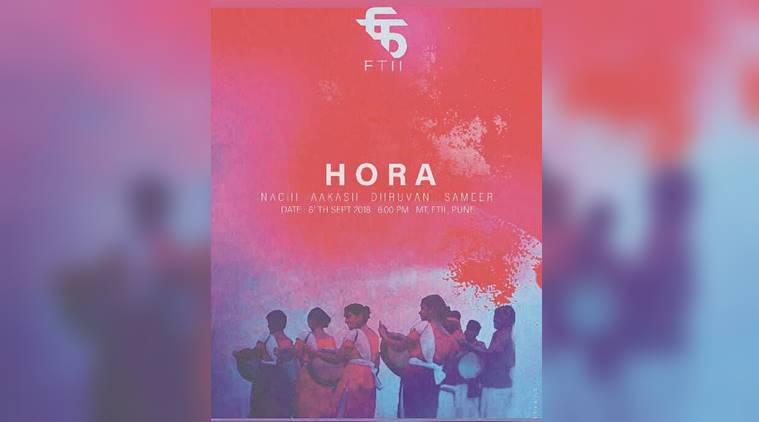 A poster of the documentary, Hora.
A poster of the documentary, Hora.
Students of the Film and Television Institute of India (FTII) have alleged that the institute cancelled the screening of a documentary on political and cultural troupe Kabir Kala Manch (KKM) under pressure from the Akhil Bharatiya Vidyarthi Parishad (ABVP), and due to ‘security concerns’ raised by the FTII security officer.
FTII authorities, however, said the screening was cancelled as students had not obtained the requisite permission from the administration for a ‘public screening’.
The 20-minute documentary film, Hora, is a third-year academic project by four students — Harishankar Nachimuthu (director), Akash Gawli (editor), Dhruvan Gautam (cinematographer) and Sameer Thorat (sound design). It features performances and interviews with members of KKM. It was scheduled to be shown at the institute’s main theatre on Thursday evening
KKM is a political and cultural music group that was formed in Pune after the 2002 riots in Gujarat, with an aim to ‘spread communal harmony’. The outfit began using protest poetry and plays to take on government policies and address social inequalities. However, in 2011, the Maharashtra Anti-Terrorism Squad booked some KKM members under the Unlawful Activities (Prevention) Act for their alleged links with Naxal groups.
In a statement, the FTII students’ body alleged that the screening was cancelled after the administration received “requests or threats” from ABVP.
“It has been conveyed to Nachimuthu that the decision was made after the institute administration received requests or threats from the ABVP. The production of the film followed the same process as any other student project made at FTII. The content of the documentary, which is said to have caused the issue, was approved, scrutinised and mentored by the faculties at the institute. The above-mentioned organisation [ABVP] has a history of being detrimental to freedom of expression. Rather than making sure that the screening of the film goes as per schedule, the institute administration has succumbed to pressure,” stated the students’ body.
“…Kabir Kala Manch is not a banned organisation and the public performances documented in the film had taken place with police permission,” the statement further reads.
Refuting the allegations made by the students’ body, FTII Director Bhupendra Kainthola said the documentary’s director, Nachimuthu, had not obtained prior permission for screening it in the main theatre. “Documentaries are screened for internal assessment only and are not screened for the public unless otherwise decided,” he said.
“In this case, Nachimuthu invited outsiders for the screening without intimating the authorities. He publicised the screening schedule on social media, keeping the authorities in the dark. Further, the film does not have CBFC (Central Board for Film Certification) certificate. Claiming that the screening was called off due to a threat from a particular organisation is preposterous,” said Kainthola.
The documentary’s director, Nachimuthu, who had headed the FTII students’ body during 2015 strike, rubbished the reasons cited by Kainthola.
He said the screening was not a public one and only those who were part of the production, such as troupe members and persons who had helped in the making of the film, were invited for it.
“Initially, the Dean (Films) gave us a letter (for cancelling the screening), saying that on the advice of the security officer, they were cancelling it. Now, the FTII director says that the reason for cancellation is lack of permission. It clearly shows that they are lying,” said Nachimuthu.
This is not the first controversy involving KKM, FTII students and ABVP activists.
In August 2013, members of ABVP had allegedly beaten up some FTII students during a scuffle that broke out after students of the institute had organised a performance of KKM artistes and screened a documentary made on the troupe by Anand Patwardhan, named ‘Jai Bhim Comrade’, at the National Film Archive of India.